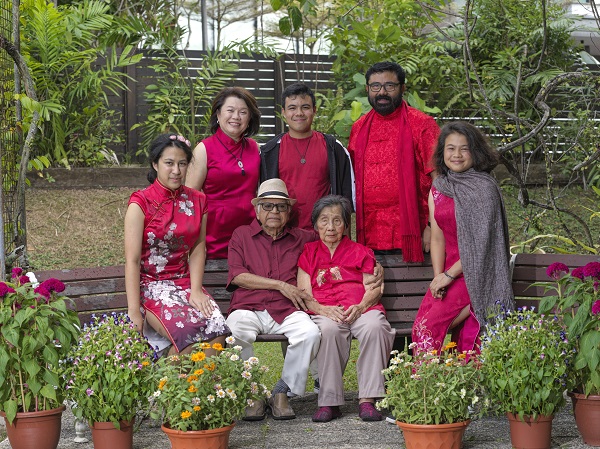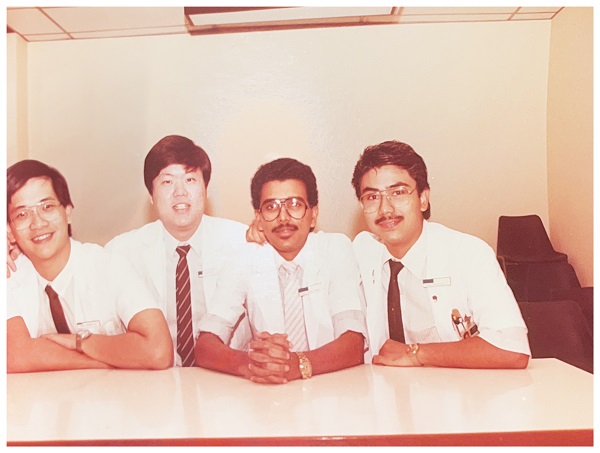Doctor in the house? There are five in the Murugasu family.
It was a triple celebration for the Murugasu family yesterday. Two of them – son Euan, 24, and daughter Deirdre, 25 – received their Bachelor of Medicine and Surgery (MBBS) degrees at the National University of Singapore convocation. And another daughter, Belinda, received her Master of Medicine in Paediatrics at the Kallang Theatre.1
This Straits Times news report from 1986 now seems like a lifetime ago!
Both my parents are doctors, medical school classmates from the class of 1947, together with Tun Dr Mahathir and Tun Dr Siti Hasmah who rose to the highest echelons of political power in Malaysia. Along with Datuk Dr Wong Soon Kai, who became the Deputy Chief Minister of East Malaysia, theirs was a unique class that came together in the post-World War II days from all parts of Malaya to undertake medical studies at King Edward VII College of Medicine at the Sepoy Lines campus.
My father, JJ Murugasu (well known to many of our SMA Members since he terrorised them as medical students) went on to specialise in paediatric surgery, training in Melbourne in the 1950s, then worked in Singapore General Hospital's (SGH) general surgery B unit. He resigned in the early 1970s and set up the People's Surgery at Selegie Complex.
My mother Ng Chiau Gian was the real brains of the couple – always a distinction student, she went on to specialise in her five children while working at the Maternal and Child Health Clinics in Kreta Ayer and Pasir Panjang.
In some ways, perhaps my mother had more influence over our eventual choice of career, as she epitomised the loving and caring primary health doctor.

Recent Lunar New Year family photo in the garden at my parents’ home; they are both in their 90s now
Parental influence
Of us five children, my parents had encouraged Audrey and Christopher to consider taking up medicine. They both flatly refused and took up unrelated degrees overseas. My parents then actively discouraged Belinda and Deirdre from doing medicine, and yet both went on to become doctors! By the time it came to me, my parents said: "Go do what you want. After all, none of your siblings took our advice!" This was not much help as I had very varied interests, especially in the arts, music and literature. The only science subject I actually liked was physics, simply because there was no "mugging" required in physics, unlike biology and chemistry.
Growing up, I would follow my parents around in the hospitals or outpatient clinics, so I was exposed to patient care from a very young age. I recall my Ah Ma Che, a deaf-mute live-in nanny, taking me to the Kreta Ayer Clinic (now an upscale karaoke lounge) and walking the streets of Chinatown and Tiong Bahru, as we lived at Sepoy Lines where my father was then working.
Later, I would accompany my father on weekend ward rounds at Mt Alvernia Hospital (MAH) where he did most of his surgeries, and so got to meet many of his colleagues: the nuns and the staff at MAH's wards and OT. As I got older, I would sometimes follow him into the OT to observe surgery and witness my father's "infamous temper" and shouting at work! What a terror he could be at times, and yet he always showed great compassion with his patients. My mother would often tell us that he did not charge the poorer patients, and that he also often treated religious patients free of charge. To this day, many people still tell me about my parents' kindness to them or their parents.
So, yes, I did get to see how much good a good doctor could offer to his/ her fellow human beings. But I also saw the great stresses of a doctor's life. My father would say to us: "Our patients have to come first!" He even warned my non-medical wife the same before she married me. That is: "you may come second to your husband's patients at times. Can you accept that? You must be aware of this unspoken code." – a reminder of the Hippocratic Oath we took when we became doctors.
This is true – as doctors, our time is not our own. We live at the beck and call of our pager or answering service, especially in my parent's time. I hardly saw my father outside of work. But we did have nice weekend breaks at St John's Island when our parents volunteered to do the weekend calls there. We often went with the Fung family (Dr William Fung, Orthopaedic, SGH). We would have the entire island to ourselves, and we lived in the spacious British-built bungalows overlooking the cliffs and the Sisters' Islands in the distance. Plus, we had the exclusive service of two Hainanese chefs who cooked for us amazing meals. As a child, it was paradise.
So oddly enough, I looked very much forward to my parents going on-call at St John's Island back in the 1960s and 70s, because that was when we had them present with us most of all.
Choosing medicine as a career
My A Level cohort was actively encouraged by the Public Service Commission (PSC) to drop science subjects and take up the arts and humanities. PSC even offered full scholarships to Oxford University and to come back to a guaranteed job in the Singapore Administrative Service.
As a St Joseph's Institution boy, I recall being persuaded and cajoled post-O Level to move to Hwa Chong Junior College for the Prom Shaw Scheme (Humanities Programme). The only science career that piqued my interest was medicine and surgery, as I viewed these as incorporating arts and crafts compared to the pure academic sciences.
Perhaps if the PSC had not been so adamant on controlling my future, I might well have gone to Oxford to pursue philosophy, politics and economics (PPE), or law, but the eternal maverick in me screamed "bloody murder" and doggedly applied to NUS Medical Faculty to spite the system!
When I turned up for my medical school interview, the interviewing panel was blunt in discouraging me from taking up medicine, by stating that I already had two sisters in medicine who would replace my parents. To rub salt into the wound, PSC then offered me a Full Overseas Merit Scholarship to do any course except medicine, which infuriated me even more!
In my year, we were subjected to a plethora of IQ and personality tests by PSC, so much so that the NUS and Ministry of Defence got impatient and conducted a balloting exercise to disrupt the pre-medical students for the Vocational Assessment Scheme (VAS) exercises. As luck would have it, almost none of the scholars were balloted! Many of my A Level batch were pushed to the graduating class of 1987 as a result of this ballot.
So, in the end, fate caught up with me after my entire cohort had completed their VAS. I joined the matriculating class of 1981 after term had started. One day I was running around SAFTI Military Institute and Peng Kang Hill, and the next day I was at Sepoy Lines for my medical school orientation! Five years flew by, and my sister Deirdre and I graduated in 1986.
Housemanship at SGH
My class was hit badly when one-third of the cohort was failed in general surgery by a certain eminent surgeon (who shall not be named). As a result, we started with a severe manpower shortage as house officers (HOs). I recall doing my SGH general surgery posting with only one other HO. We did not go home that posting, doing every-other-day calls and sleeping in the Houseman quarters as we struggled to each complete the stack of 40 to 50 discharge summaries!
One night, at surgery A unit, I was the only HO covering all the surgical wards and paediatrics surgery. That night, the operator erroneously paged my father to come to Ward 55 to give IVs. The ward nurses had asked to page "Dr Murugasu"; he looked up his rolodex and promptly called JJ Murugasu to come to SGH! Well, you can imagine what happened next; my father promptly called me and yelled: "Get off your butt and go to the ward!" Such tender words indeed!

NUS Medical Faculty final year SGH posting with classmates. Can you recognise who’s who? One of us now runs Parkway Pantai IHH group of hospitals
Specialisation
After completing my National Service (NS), my cohort was the first hit by the restructuring exercise in the late 1980s. Overnight, we were told that we would be employed by SGH or National University Hospital instead of the Ministry of Health! I joined SGH as a general surgery trainee in 1989. After a while, I realised that general surgery was no longer the same as when I was a medical student. Rapid subspecialisation had forever changed the landscape of general surgery.
I had the good fortune of doing a short three-month NS posting to Tan Tock Seng Hospital's ENT department, and I thoroughly enjoyed the scopes and technologies that were fast emerging in ENT at the time. We had just started using nasal endoscopes to examine patients and there were huge advances in hearing-assistive technologies such as cochlear implants coming into clinical practice.
After one posting in general surgery, I made the switch to ENT. I never asked my general surgeon father if he approved of the switch, but suffice to say, he supported my decision and allowed me to then push off to the UK for my postgraduate training from 1990 to 1996. I completed my Fellowship of the Royal Colleges of Surgeons in Edinburgh and London in 1992. I went on to pursue a PhD programme in Auditory Physiology at the University of Sussex under the UK Committee of Vice-Chancellors and Principals of the Universities of the United Kingdom Overseas Research Scholarship Award and the Lee Kuan Yew Scholarship in 1997. Looking back, it was a masochistic exercise, as I was also working full time in the National Health Service as a specialist registrar with hospital duties and a "one in three" on-call roster, and yet also spending all my evenings and weekends in the laboratory on my research work. My chocolate Labrador, Max, kept me sane and grounded as I had to walk him twice a day.
Through those six years, my parents were my pillars of support. Even though my parents never liked travelling, my mother made a special visit to stay with me for six weeks with Mrs Wong Hock Boon in the summer of 1994. I benefited greatly from a steady stream of home-cooked food!
Conclusion
When I look back at the past 30-odd years, I am grateful for the insight my parents gave me into their lives as doctors; in essence, they had no work-life balance. Back then, they seemed to live in and around the hospitals and wards (literally) and as children, we would crave their attention and guard jealously whatever time they could spare for us outside work.
Today, my own life as a parent is vastly different and I am much more involved (the kids would say too much!) in the lives of my three children. Even so, I think we should all strive for a healthy work-family life balance in this crazy, frenzied world, where our family provides us with a bedrock of love and affirmation.